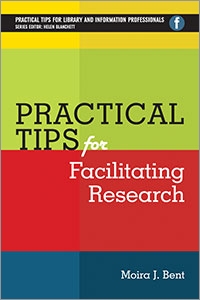
Primary tabs
You don't need to be an ALA Member to purchase from the ALA Store, but you'll be asked to create an online account/profile during the checkout to proceed. This Web Account is for both Members and non-Members.
If you are Tax-Exempt, please verify that your account is currently set up as exempt before placing your order, as our new fulfillment center will need current documentation. Learn how to verify here.
- Description
- Table of Contents
- About the author
- Reviews
Interacting effectively with information is at the heart of all research, and information professionals have a key role to play in facilitating the development of researchers who are able to operate confidently and successfully in the information world. Grounded in current theory and informed by practitioners from around the world, this practical book offers a wide range of ideas and methods to assist library and information professionals in developing and managing their role in the research environment, including
- landscapes and models;
- structures and strategies;
- places and spaces;
- library staff roles;
- collections;
- specific interventions in the research process or lifecycle;
- teaching approaches; and
- information literacy skills workshops and programs.
1. Introduction
- Introduction
- My story
- About the book
- Context
- Terminology
- Structure of the book
- How to use the book
- A note about references
- References and further reading
2. Section summaries
- Landscapes and models (Section 3)
- Structures and strategies (Section 4)
- Places and spaces (Section 5)
- Staff (Section 6)
- Collections (Section 7)
- Specific interventions in the research process or lifecycle (Section 8)
- Teaching approaches (Section 9)
- Information literacy skills workshops and programmes (Section 10)
3. Landscapes and models
- Ensure you understand what ‘research' is
- Ensure you understand who researchers are
- Make reference to researcher development models when appropriate
- Keep up to date with information literacy models and theories
- Learn about threshold concepts
- Think about research lifecycles
- Research assessment
4. Structures and strategies
- Collaborate with other sections of the organization
- Develop the library as a publisher
- Define library staff roles and library structures
- Develop a research data management strategy
- Generate income from research activity
5. Places and spaces
- Host research events in the library
- Engage distant researchers in real time
- Develop research zones
- Host research exhibitions in the library
- Get involved with local research conferences and events
- Be a secret shopper
- Become an embedded librarian
- Go on tour
- Join virtual research communities
6. Library staff roles
- Assess and develop staff skills and expertise
- Become an author yourself
- Write book reviews
- Become a researcher yourself
7. Collections
- Develop modern research collections
- Promote special collections as a unique selling point
- Explore alternative document delivery models
- Involve researchers in enhancing research monograph collections
- Exploit the modern collection
- Explore access to shared research collections
8. Specific interventions in the research process or lifecycle
- Identifying opportunities in research workflows
- Make early contact with the research community
- Attend research group meetings
- Communicate your message effectively
- Contribute to research proposals
- Charge for literature searches
- Systematic reviews – get involved in the planning process
- Systematic reviews – advise on resources
- Systematic reviews – help with writing up
- Engage with research data
- Advise on data management plans
- Facilitate the writing process
- Make researchers aware of what editors and publishers want
- Develop awareness of fraudulent publishing practices
- Facilitate a Community of Writers
- Assist with open access advocacy
- Do some research into open access issues yourself
- Create open access and publication process flowcharts
- Promote your institutional repository
- Create unique researcher identifiers
- Bibliometrics
- Assist in tracking citations
- Publicize research output
- Celebrate theses
9. Teaching approaches
- Learn some teaching theory to enable you to plan for successful teaching
- Track activity to help identify points of need in the research lifecycle
- Aim for just-in-time teaching
- Offer individual consultations
- Gain prior knowledge of participants
- Involve researchers in teaching
- Video personal stories
- Teach the teachers
- Deliver short focused sessions
- Involve employers
10. Information literacy skills workshops and programmes
- Holistic information literacy programmes for researchers
- Generic information literacy skills programmes
- Online resources and programmes
- Diagnostic tools
- Making an impact workshops
- Writing workshops
- Open Access workshops
- Workshops on ethics, licences and contracts
- Social media workshops
- Bibliometrics workshops
- Workshops alerting to fraudulent publishing practices and misleading metrics in workshops
- Research data management workshops
11. Bibliography
Moira J. Bent
Moira J. Bent is Faculty Liaison Librarian and National Teaching Fellow at Newcastle University and is one of the authors of the 2007 Facet book, Providing Effective Library Services for Research.
"Benefitting from Bent's exhaustive research and robust content, this volume will be very useful for academic librarians, particularly subject and faculty liaisons and instruction librarians."
— Library Journal
"Comprehensive and thoroughly 'reader friendly' in tone, content, organization, and presentation, Practical Tips for Facilitating Research is strongly recommended for library and information professionals who work with research staff and students and an essential, core addition to college and university Library Science reference collections and supplemental studies lists."
— Midwest Book Review
"... a book that offers a variety of approaches, insight, and real-world examples that work – exactly what you need whether you are searching for a simple solution to quickly improve services, or ideas to help inform and shape a more fundamental or strategic change."
— Michelle Dalton, Libfocus


